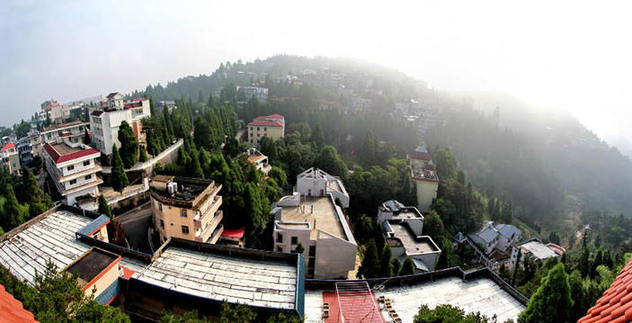Unforgettable Guling
By staff reporter GONG HAN
In February 2012, on a visit to the U.S., then Vice President Xi Jinping recounted an old story of friendship between China and America: An American man called Milton Gardner grew up in Guling (Kuliang in Fuzhou dialect), China. He had fond memories of his childhood there and often wished he could return. Sadly, Gardner died before he could fulfill his dream, but in 1992, his wife, Elizabeth, made a long-awaited trip to the village. She, too, soon fell in love with Guling and China.
|
 |
|
Early morning in Guling. Zhou Xinjian |
Finding “Kuliang”
On August 22, 1992, Elizabeth arrived in China from San Francisco at the invitation of Xi Jinping, who was working in the Fuzhou government, Fujian Province. Twelve kilometers east of Fuzhou following the winding roads that scale the mountainside is Guling with rolling hills that extend for miles.
Fuzhou is known to be a “furnace” in the summer months owing to the surrounding mountains. But Guling is an exception. With an average altitude of 800 meters, Guling is cooler than urban Fuzhou by seven to eight degrees because of its proximity to the Minjiang Estuary. A fresh breeze, Japanese cedars and rolling mist are its main characteristics. Especially in the spring, the entire region is shrouded in ethereal white mist.
Her visit in 1992 was not Elizabeth’s first time in China. In 1986, as Gardner’s health deteriorated, he would murmur, “Kuliang, Kuliang” repeatedly. Elizabeth knew he was trying to tell her about his childhood home in China and so set about finding “Guling,” making five trips in search of the mysterious place. She went to one Guling in Jiangxi Province and another Guilin in Guangxi Zhuang Autonomous Region, but neither turned up the result she was after.
One day in 1990, Elizabeth was sorting out Gardner’s book collection and found 11 Chinese stamps. An international student, Zhong Han, from China helped her decipher the characters and to Elizabeth’s delight, several stamps bore the postmark, “Foochow Kuliang.” Elizabeth wept with joy – she had finally found “Guling” for her husband.
In 1992, then Party Secretary of Fuzhou City Xi Jinping read about Elizabeth’s quest in the paper. Touched, he decided to invite Elizabeth to visit Guling. Thus, a long severed bond between an elderly American and a Chinese village was rebuilt.
Zhu Wen was one of the staff that greeted Elizabeth when she arrived in Guling. He recalls that she was tall, passionate, humorous and full of enthusiasm.
Standing in front of a huge cedar, Elizabeth recalled excitedly the tales Gardner used to tell about racing his little Chinese friends up the tree. It was always such a joy to Gardner if he won the tree-climbing game.
Listening to Elizabeth’s recollections, Qiao Mei, a journalist from Fuzhou Daily, broke off a branch from the tree and handed it to Elizabeth. “Maybe you can feel his joy in this branch,” she suggested. Elizabeth held the branch up to her nose and inhaled deeply. She carried the branch wherever she went that afternoon.
Elizabeth’s visit was out of the ordinary for the deputy director of the Fuzhou Foreign Affairs Office, Chu Yanli, who would normally receive foreign government officials. Chu also remembers clearly how on the day Elizabeth arrived, she sat in a cane chair on the veranda for some time, under the setting sun.
“I suppose Elizabeth was talking to her husband in her heart. She had finally made it to the place Gardner had so often talked about. The scene was quite moving.”
The next morning, Elizabeth told her companions that she had had the sweetest night’s sleep during her stay in China.
